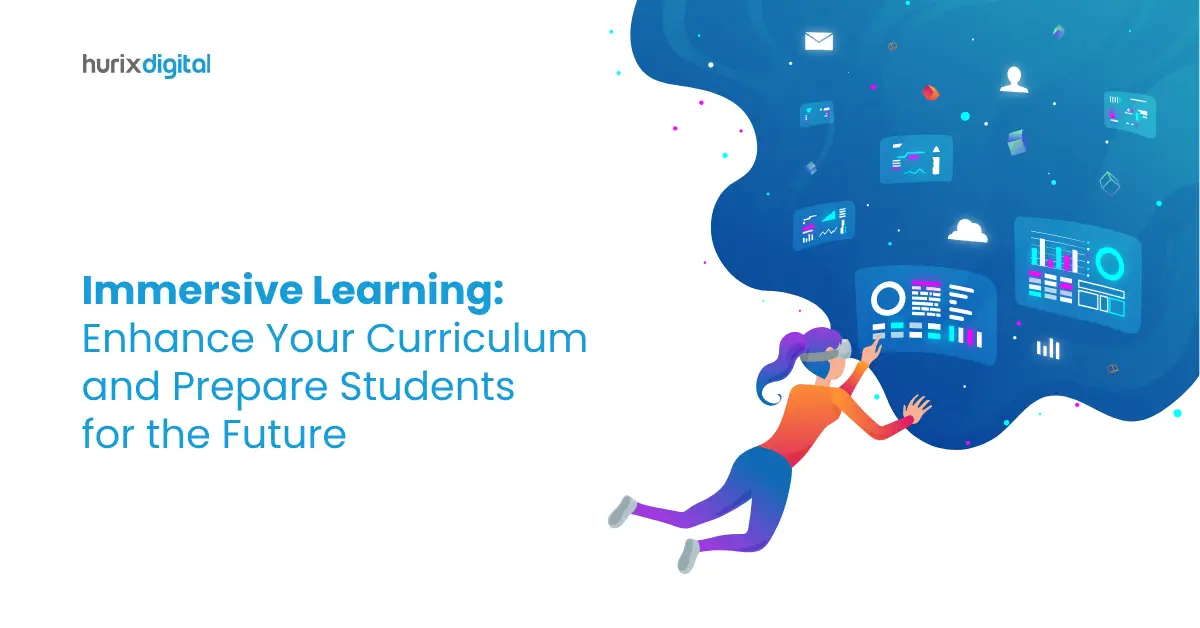How Can Immersive Learning Help Prepare Students for the Future?
The concept of immersive learning has changed vastly over the past couple of years. What used to consist of field trips to the zoo, a monument, the courts, or a museum is today being replaced by technology.
Gone are the days when learning in a classroom merely involved a teacher or a professor standing in front of a class and reading out a textbook all day long. Today, education technology such as Artificial Intelligence (AI), Machine Learning (ML), and Virtual Reality (VR) have made day-to-day learning a lot more immersive and engaging.
What benefits does immersive learning, as we know it today, offer students and teachers? How can including AR education and VR education in curriculums prepare students for the future?
This guide takes you through each of these aspects in detail, thereby giving you a window into the future of the world of education.
Table of Contents:
How Can Immersive Learning Prepare Students For the Future?
In this section, we take a quick look at the various benefits of immersive learning in education and how it can help enhance your curriculum and prepare students for their future.
However, before we do so, we’ll take you through the various types of technologies that can offer an immersive learning experience.
Some of these key technologies include the following:
- Virtual Reality – VR immerses users in an alternative digital world using specifically designed VR headsets.
- Augmented Reality – AR blends the real world with digital content, and this could be flat, 2D, 3D, and more.
- Mixed Reality – This combines elements of virtual and augmented reality, and like the latter, it overlays digital content with the real world.
- 360° Film – Unlike computer-generated content, 360° film tends to be live filmed, anchoring the learner in the filmmaker’s viewpoint.
Now, let’s dive into the benefits of immersive learning.
1. It Improves Learning Retention
Immersive learning has the potential to improve information retention among students. In fact, a study shows that VR as a form of immersive learning can help students recall information correctly by 75%.
This goes to show the extent to which immersive learning technologies can help students retain information for longer and more accurately than they would via traditional rote learning methods.
Additionally, immersive learning also helps prepare students for the future by giving them practical exposure to a host of concepts that they’d otherwise only read about. As a result, when immersive learning modules are incorporated into the curriculum planning process, they can help teachers and students meet their learning objectives better.
2. It Can Help Students Experience the Impossible
While field trips can be great resources to help offer experiential learning, they tend to have their limitations. These could be due to budgets or simply because certain experiences are simply too dangerous or impossible to experience.
In situations like these, immersive learning technologies like VR can come in handy when incorporated into curriculums. For example, if you’re teaching a course on marine biology and you think it would help to have your students witness how the ecosystem in a coral reef works, doing so in practical terms could be challenging.
However, VR can help your students experience what the world underwater looks like, and how the various organisms in coral reefs contribute to a healthy ecosystem. As a result, including immersive learning in curriculums can go a long way in augmenting the benefits of experiential learning as it adds a practical element to the learning experience.
Also Read: What is Immersive Learning? Implementation, Best Practices, Benefits
In fact, statistics show us that the market for VR in education will grow at a CAGR of 39.2%, from $11.8 billion in 2023 to $16.42 in 2024. This goes to show the extent to which this technology is already making an impact and that its use is expected to increase with time.
3. It Helps Students Develop Critical Problem-Solving Skills
Another key advantage of immersive learning that can help prepare students pursuing their K12 education for future roles is its ability to help improve their problem-solving skills. Every curriculum aims to imbibe critical problem-solving skills in students, but only some truly succeed, especially when done via traditional learning methodologies.
Traditional rote learning often relies on producing memorized answers to complicated questions or scenarios, thereby reducing the opportunity for students to think critically.
On the other hand, when students are presented with a scenario in an almost life-like context, they stand a better chance of learning how to navigate any practical challenges thrown at them. When incorporated into curriculum development, these problem-solving skills can be crucial when students find themselves in a competitive professional landscape.
4. It Facilitates the Practical Application of Knowledge
While this might seem rather similar to the previous point, it can be an entire point of discussion in itself. One of the key benefits of immersive learning methodologies is that they help instill practical knowledge in students’ minds rather than just theoretical information.
As a result, elements of immersive learning and gamified learning bridge the gap that individuals often face when they find themselves in a professional workplace, where the knowledge gained from books has little impact on their ability to apply concepts in real-life scenarios.
The practical experience gained from immersive learning enables students to seamlessly be more capable of finding practical solutions to problems, thereby keeping their contribution to their new environment.
5. It Can Help Develop Critical Soft Skills
Aside from all the benefits in terms of developing hard or technical skills, immersive learning and technologies like AI can also help students develop a more global perspective and become empathetic human beings.
Unlike the past, when students were limited to viewpoints, histories, and perspectives from their immediate environment, technology today can help transport students anywhere in the world, allowing them greater exposure to different cultures, traditions, identities, and more.
This exposure, in turn, can help them grow into globally competitive and aware individuals while also developing key skills like empathy.
Also Read: Why Should Your Institute Invest in Immersive Learning Modules in 2024?
In Conclusion
Immersive learning is one of the most impactful technologies in the world of education today, and its use is only expected to increase with time. Incorporating elements of immersive learning in student curriculums offers a host of benefits, strengthening their foundations for the future.
From improving learning retention to building critical problem-solving skills, the list of these benefits is endless. These benefits demonstrate the extent to which the use of such immersive learning technologies is set to increase in the future.
If you’re an educational institute that’s looking to capitalize on the benefits of this changing landscape, reach out to like digital curriculum providers Hurix Digital and experience their e-learning and training solutions today!

Senior Vice President – Business Development
Over 25 years of experience in the edtech and workforce learning industry with strong skills in Business Development, Customer Relationship Management (CRM) and Strategy.









